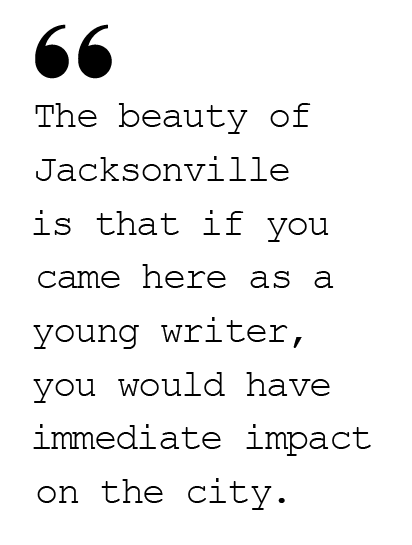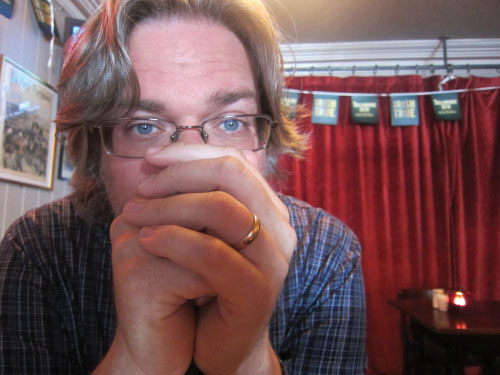
Of all the places for this well-established journal, Fiction Fix began in a classroom at UNF, the same classroom where current editor-in-chief and UNF alumni Apri Wilder first met Creative Writing Professor Mark Ari. “He has a very larger-than-life personality,” Wilder said, “and he was like the center of gravity for his students.”
Fiction Fix, which has a large staff of UNF students and alumni, is one of the things that contributed to Jacksonville’s growing writing scene, and UNF may have had a major role in its germination.
“The diaspora of UNF has helped to keep the [writing scene] alive,” Wilder commented. “UNF and the other literary cultures have started to grow around Jacksonville. It’s just blossomed into this amazing scene where people are really passionate about literature and about it together, rather than in their own separate spaces.”
A reason for this bustling activity could point to a single person: Mark Ari. The UNF creative writing professor is involved in and has advised for many of these projects, and many of these leaders in creative publishing are his former students. Ari, to these leaders, has a knack for encouraging inspiration in his students, or at least the ones who are really serious about pursuing a writing career. It may be his passion for art that spills over to his students.
 “There’s nothing in the world [that does more] than what art does for you,” Ari said. “It expands your vision of the world. It takes the soul that we take for granted and makes you aware of it and makes you aware of other souls. [Art] allows two souls to communicate over time and distance. It sharpens your intellect. You see better. You smell better. You taste better. You’re more alive.”
“There’s nothing in the world [that does more] than what art does for you,” Ari said. “It expands your vision of the world. It takes the soul that we take for granted and makes you aware of it and makes you aware of other souls. [Art] allows two souls to communicate over time and distance. It sharpens your intellect. You see better. You smell better. You taste better. You’re more alive.”
Born to Jewish parents, Ari grew up in Brooklyn, New York, and eventually quit school because he disagreed with the way the academic system taught its students. During this time, he read and wrote voraciously and became involved in Brooklyn’s art and literary community. Ari later went back to school and eventually earned his MFA from Brooklyn College of the City University of New York.

When he moved to Jacksonville in 2001, Ari brought his knowledge of creative writing publications to his students and, retrospectively, to the city. Aside from encouraging the inception of Fiction Fix, Ari has contributed work in current local journals that he’s advised including Perversion, a recent art and literature magazine founded by one of his former students, Carl Rosen.
Rosen, who graduated from UNF and is a full-time freelancer for several Jacksonville publications, started Perversion as a way to showcase the work his friends were creating. He wanted to create a platform for writers and artists that had a more progressive way of looking at their community. Initially, the magazine, which currently has four issues, featured artwork that Rosen deemed as more “progressive.” Rosen said he wanted to change the kind of art that was prevalent in Jacksonville, which he defined as being more traditional.
But as Rosen and his Perversion crewmembers, several of whom are UNF alumni, produced issues two, three, and four, the content spread to cover more social and cultural topics. Issue four includes local author Tim Gilmore’s story on LaVilla, Jacksonville’s former cultural hub that was a harlem of the south.
Rosen recounted that many of his friends flew off to New York and Los Angeles after graduation, but he believes that there’s something good brewing in Jacksonville.

“There’s an awakening of sorts for people who are interested in music, art, movies, culture. I think seeing all of these businesses and counter culture niches popping up is worth the while to stick around and see it out and also have a part of it,” Rosen said.
Community support is a key ingredient that has been keeping Jacksonville’s literary scene alive. Ari advised writers outside of Jacksonville who wanted to start up a literary magazine, including current Bridge Eight publisher Jared Rypkema. The New Jersey native founded the magazine as a means to build a community for writers by publishing work by local authors.
“Jacksonville is known for its seven bridges, so we felt there was a need for an eighth one — a metaphysical bridge that would bridge the gap between arts, culture and development,” Rypkema said.
 Rypkema appreciated Jacksonville and its burgeoning art and performance community, but felt a lack of movement for the writing community. His magazine started a year and a half after he formed the Left on Mallory in 2013, an organization that hosted writing workshops in his home on Mallory Street in Riverside Jacksonville.
Rypkema appreciated Jacksonville and its burgeoning art and performance community, but felt a lack of movement for the writing community. His magazine started a year and a half after he formed the Left on Mallory in 2013, an organization that hosted writing workshops in his home on Mallory Street in Riverside Jacksonville.
“Jacksonville had this optimistic aura about it, but inside it were a lot of the criticisms that people still have about the city,” Rypkema said. “But I felt optimistic that these [criticisms] could be changed. Maybe it would take the artists to change some of that.”
With magazines like Fiction Fix, Perversion and Bridge Eight, Inc., it seems that there are growing opportunities for writers to get out and show their work with others, and most likely get support.
Tim Gilmore, another UNF alum who also founded Jax by Jax writing festival, commented several years ago that he wouldn’t recommend a young writer to Jacksonville, but now he believes otherwise as this creative collective bubbles and brews. These publications serve to be the connective glue that brings writers, old and new, out of the woodwork.
“There’s always been writers here, always been stuff happening. There’s a lot of people writing and a lot of people are aware of it,” Gilmore said.

Although there has been positive change in the past few years for Jacksonville publishing, there are still changes to be made. To some, changing things on a systemic level is necessary.
Rosen said he believes the university needs to continue to provide more programs to creatives as way to better prepare them for post-graduation endeavors.
“The writer’s lifestyle is really hard and when you find someone who’s actually committed to doing that, man, nurture them, so they’re prepared with tools to make them successful.”
But many of the leaders in publishing are aware that their magazines are not to turn around a huge profit. For now, these publications are here to sustain themselves and to share stories that resonate with readers and future writers.

“The beauty of Jacksonville is that if you came here as a young writer, you would have immediate impact on the city,” Rypkema said. “Whereas if you went somewhere else, you could easily be one of the crowd. So for a young writer here, we’ve established enough of a community so that the writer wouldn’t be alone.”
Jacksonville is on the verge of becoming the literary city of the south, and the leaders in publishing and writing, many whom the university has groomed in their writing skills, have been contributing to this developing notion. The university, particularly the faculty like Mark Ari, has been the fertile soil to sow the seeds of creative potential for young writers.
To create a magazine is a labor of love, one that takes hard work. But in the end, it’s worthwhile when an issue comes out — fresh with content, ideas and life.
—
For more information or news tips, or if you see an error in this story or have any compliments or concerns, contact editor@unfspinnaker.com.







